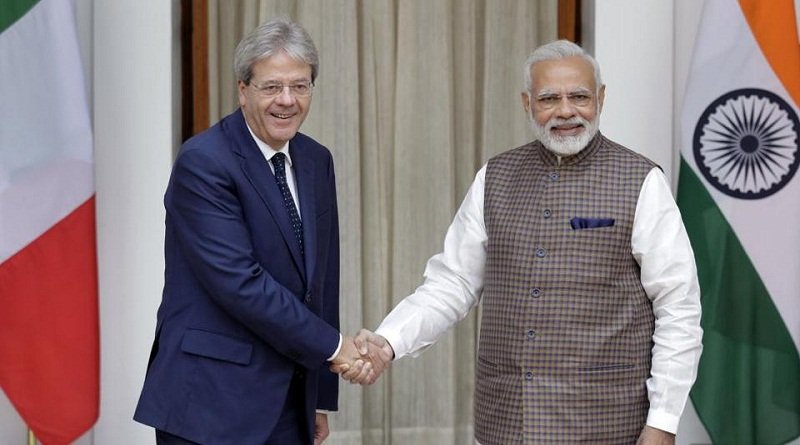From the Shores of the Mediterranean to the Banks of Yamuna

India witnessed an unusually large number of important incoming high-level visits during the past month or so which clearly attests to India’s rising international stature.
This will probably be capped by the 2018 Republic Day celebrations when we shall host the 10 Heads of State from the ASEAN countries to celebrate 25 years of India-ASEAN increasing engagement. PM Modi’s recent visit to Manila to attend the East Asia Summit as well as Indo-ASEAN Summit and several other major interactions clearly indicate the pivot of India’s “Act East Policy “ that acquired exceptional momentum since the government of PM Modi took charge. However, amidst this two other significant visits from the shores of the Mediterranean need to be counted in. After a decade-long hiatus of exchanges, Italian Prime Minister Paolo Gentiloni broke the ice and visited India on October 30 when he had detailed discussions with PM Modi, President, Vice President and External Affairs Minister of India, while he was given a ceremonial reception in the forecourt of Rashtrapati Bhawan.

Italian Prime Minister Paolo Gentiloni visited India and signed 6 MoU | Credits twitter.com @narendramodi
His predecessor Romano Prodi had last visited in 2007. Gentiloni was quite keen to visit as Foreign Minister and had met EAM Mrs Sushma Swaraj in 2016 when she visited Rome for the Canonisation ceremony of Mother Teresa. Earlier on the sidelines of G-20, he met PM Modi. Gentiloni was accompanied by 15 CEOS who interacted with their Indian counterparts focussing on trade and investment. Over 600 Italian companies have been in India for years and working in diverse areas. Now their focus is also on infrastructure, defence and food processing.
Italy is the 5th largest trading partner in the EU with $ 8.79 billion last year. Italian firms have invested over $2.4 billion till last year in automotive, serves, trading and food processing sectors and remains the 13th largest investor in India. Four MoUs were signed encompassing rail safety, energy, mutual investments, culture and celebration of 70 years of diplomatic partnership. Tourism is yet another area of cooperation and with direct Alitalia flights between Delhi & Rome starting with the visit augurs well for enhanced people to people interactions. He also addressed a select gathering arranged by the Observer Research Foundation where he liberally responded to the current global scenario questions including BREXIT, while acknowledging and praising PM Modi’s strong leadership.
India and Italy can claim historic ties and will be celebrating 70 years of diplomatic relations in March next year. However, since 2012 the interactive mechanisms have been stunted and often turned hostile due to public posturing, pressure and domestic compulsions as a result of the controversy where two Italian Marines killed two Indian fisherman off the coast of Kerala. Two sides continued to fight the jurisdiction issue even though India as a goodwill gesture allowed the marines to travel to Italy.
While the Supreme Court retains its jurisdiction the case and hearings are going on Permanent Court of Arbitration at the Hague as preferred by Italy. This has acted as a major damper for not only the bilateral relationship but also in the EU where at the behest of Italy India-EU FTA(Free Trade Area); India’s membership to NSG and Missile Technology Control Regime have been facing roadblocks. Italy had even urged EU members to boycott Indian national days and other events. Italian diplomats definitely did abide by the diktat.
Another issue has been the bribery allegations in the Augusta Westland helicopter deal. These are cantankerous issues but from the visit of PM Gentiloni it is quite clear that despite these irritants there is an inherent desire to move forward and bring the relationship back to a moving and higher trajectory as the two countries hope to collaborate in new areas, global challenges and opportunities which include Science & Technology, cybersecurity and counter-terrorism and cooperation in defence sector.
This was amply illustrated by Prime Minister Modi in his opening statement “ In our discussions today, I felt that both of us want to take our bilateral relationship to new heights. And, this visit of yours has provided us with an opportunity to set new priorities”
On the same day another dignitary from the other side of the Mediterranean, the Foreign Minister of Tunisia Mr Khemaies Jhinaoui led a delegation for the 12th Session of the India-Tunisia Joint commission with his Indian counterpart Mrs Sushma Swaraj. This was held first time at the ministerial level. Tunisia, in 2010, became the harbinger of the so-called Arab Spring when a harassed street vendor immolated himself thereby igniting the flames of liberation from the existing authoritarian regime of the autocratic President Ben Ali who fled to Saudi Arabia.

Tunisian Foreign Minister Khemaies Jhinaoui meets Prime Minister Narendra Modi | Credits: twitter.com @narendramodi
The world was unable to understand the implicit direction of this genie in which most of the Middle East got embroiled one way or the other. While other countries like neighbouring Libya are still struggling to get their act together Tunisian political parties were able to agree to coexist and work under the new constitution with the change of power when it is due and necessary through democratic means.
India also helped in drafting the constitution. Tunisians are looking forward to a brighter future although they continue to be subjected to terrorist attacks from the groups inside and in its environs. They wish to lead a modern society. Speaking at the Indian Council of World Affairs FM Jhinaoui said that Tunisia has been on the forefront of reforms from ages especially with regard to the women equality and representation. It was in this spirit that they decided to recognize the marriage of Tunisian women with non-Tunisians and Arabs. The biggest concern remains the economic and tourism development through investment and better internal conditions and economic reforms as well as a fight against terrorism and extremism.
Hence the important Joint Commission Meeting reviewed the whole gamut of bilateral relations and to expand the frontiers of cooperation and future direction of growths for mutual benefit. They also discussed the regional and global challenges and security concerns. To energize the relations a new Road Map of India -Tunisia Partnership was initiated by the two sides. As both, the countries are celebrating 60 years of diplomatic relations in 2018 it was decided to hold a yearlong festival of India in Tunisia and Festival of Tunisia in India. Since Tunisia being part of North Africa and falls under India’s Africa initiative like the India-Africa Forum Summit (IAFS) commitments the Indian Government will be setting up a Soil, Water and Tissue Testing Laboratory.
Similarly, Tunisia wants to join the Indian global initiative of the International Solar Alliance. Both sides also agreed to set up two Joint Work Groups to find ways and means to address the issues and concerns that impede the growth of trade and cooperation, especially in agriculture while agreeing to reach a bilateral trade target of US$ 1 billion in next five years. Greater collaboration in fertilizer especially expanding the capacity of Tunisia – India Fertilizer Plant (TIFERT) through concessional credit for transportation of the raw material to the Plant. Two sides also agreed to enhance cooperation in the fields of renewable energy, infrastructure, transport and automobiles, textiles, agriculture, drugs & pharmaceuticals, healthcare, ICT, SMEs.
During the visit Six agreements in the fields of Judicial Cooperation, Cooperation in Youth Matters, ICT, Trade and Business were also signed to provide a requisite framework. Tunisia supports India’s candidature for the UNSC.Earlier during the visit of former Vice President Hamid Ansari to Tunis in June 2016 two MoUs on handicrafts and IT & digital economy were signed and both countries had agreed to fight against the scourge of terrorism. Tunisia has successfully emerged from the chaos that ensued the “Jasmine Revolution” for dignity and freedom in a broadly non-violent manner and thus provides a reasonable model format for several others in similar situation.

*Anil Trigunayat is the former Ambassador of India to Jordan. Libya and Malta
The views and opinions expressed in this article are those of the authors and do not necessarily reflect the views of The Kootneeti Team.


















